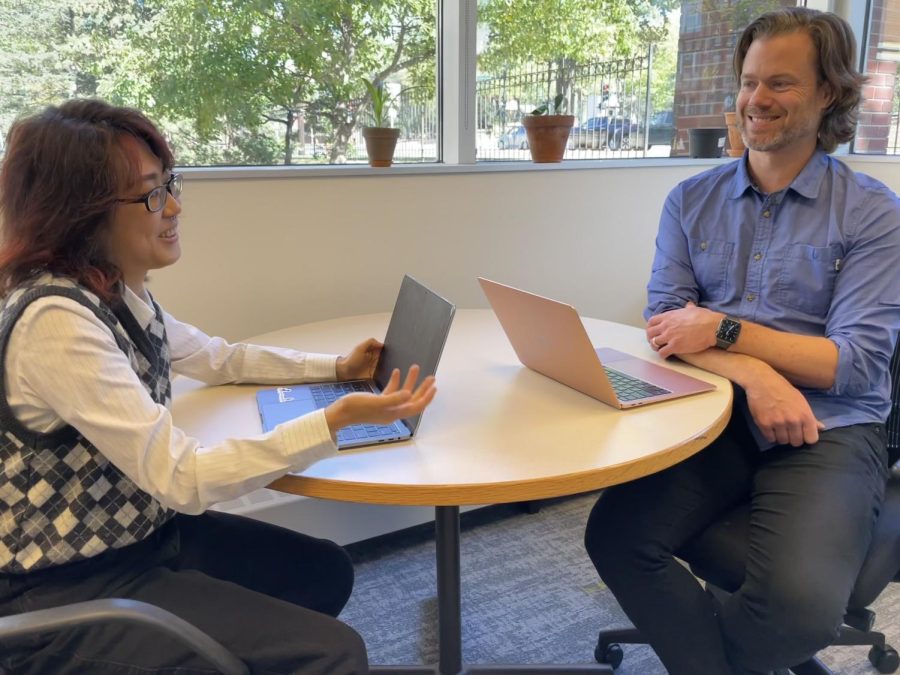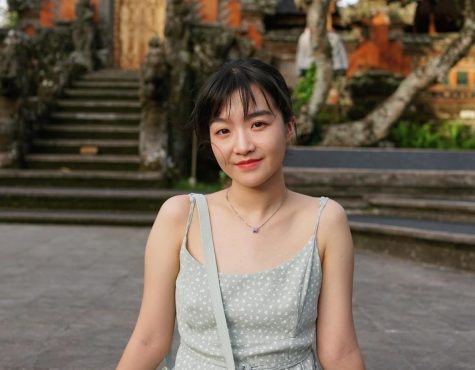Jake Mohan: fostering a writing learning community with empathy
October 6, 2022
This year, the Small Liberal Arts College Writing Programs Administrators (SLAC-WPA) awarded Macalester writing counselor and instructor Jake Mohan the Martinson Award for Innovation. According to SLAC-WPA, the award was created to recognize innovative and successful initiatives in a writing program or center from member colleges.
“I think the MAX Center should share credit for it,” Mohan said of the Martinson Award. “Our best ideas come from our students.”
This year is Mohan’s 12th year working as a writing counselor and instructor at the Macalester Academic Excellence (MAX) Center since 2011. He has always considered working one-on-one with students the most rewarding thing in teaching and the best way for a student to learn. Being at Macalester gives him the opportunity to conduct individual collaboration with a diverse group of students, especially multilingual speakers, who comprise 12% of Macalester’s student body.
“I think it is really important for a college like Macalester which has these values of internationalism and global citizenship to live up to those values … and to do everything we can to support students,” Mohan said.
Mohan hopes that receiving this award will bring more attention to the anti-racism and anti-oppressive pedagogy that he and the staff at the MAX Center have been working towards. He explained that this pedagogy is an important part of the legacy of learning centers in US higher education. After World War II, more scholarship programs allowed non-traditional students to attend college, such as armed forces, people of color and women. Learning centers were initially set up to build systems to support those students and help them adapt to the academic environment.
“[Anti-racist and anti-oppressive pedagogy] is an obligatory part of the work that a learning center has to do if it wants to be an excellent resource for students,” Mohan said.
Anti-racist and anti-oppressive pedagogy aims to mitigate the unfair judgment or discrimination that multilingual students and students of color usually face based on their grammar errors and writing accents. To help people better understand this phenomenon, Mohan listed examples like not using an article before a noun or African American Vernacular English. This is grammatical and just as capable of conveying meanings as other dialects of English, but has been discriminated against by US higher education and US culture in general for a long time.
“We should remember that it takes a very long time to learn a language,” Mohan said. “It takes an even longer time to write in that language at the graduate or undergraduate level. So, I think a lot of patience and empathy are needed.”
When it comes to empathy, Katherine (Haoxuan) Gao ’24, a writing tutor at the MAX center, expressed her agreement and personal feelings. As a multilingual speaker and international student, she understands the difficulties that international students often encounter in writing. She suggested that the lack of confidence was the number one thing she observed in other international students.
“They have a really good argument … but they’re worried that their grammar would hinder them from writing a good essay,” Gao said. “I actually learned a lot from Jake about how to engage with clients in a respectful manner, how to respect their identity … We don’t want to correct their language accent, but we want to promote their learning.”
She emphasized Mohan’s high level of empathy with the MAX Center tutors as well. With so many students seeking help from the MAX Center at the beginning of this semester, she mentioned how Mohan reminded tutors to take breaks for themselves and allow for time needed to recharge.
“I think Jake facilitates a really good writing community,” Gao said. “It’s a community that fosters a very supportive environment that allows other writing tutors to work in collaboration and help each other when we’re in need. It’s a very friendly environment and I really like my job.”
In last year’s editorial, Jake and other student tutors collaboratively authored an open letter to address the white supremacy and “hidden curriculum” that could marginalize BIPOC and multilingualism students and demotivate them from performing their full potential in academics. The letter also offers a few helpful suggestions to faculties to improve students’ writing and learning experiences.
Nick Salvato ’22, a former writing tutor who spearheaded the letter-writing project, expressed his appreciation for Jake’s support.
“He encouraged us to be bold and outspoken … I think he brought us there … It’s a very symbiotic relationship,” Salvato said.
After hearing the news of the award, Salvato was very excited for his former employer.
“I think he completely deserves it,” he said. “Jake Mohan gets it … He really understands and empathizes with the huge problems financially and racially that the universities enjoy … and he’s committed to making a difference.”
Besides the open letter, Jake has progressively developed other practical approaches to improve students’ experience at the MAX Center and systematically tackle the learning barriers for multilingual writers. In the summer of 2020, he received a grant from the Institute for Global Citizenship to create resources to introduce and educate people on how to do anti-racist writing pedagogy. He has also participated in several workshops held by the Jan Serie Center for Scholarship and Teaching (Serie Center) to present the documents to new faculty members at Macalester.
Professor of Psychology and Director of the Serie Center Joan Ostrove, found the two documents very inspiring. They coordinate well with the messages of her website, which provides insights about anti-racist pedagogy and other stressors that impacted education since the start of the pandemic.
“Both of these documents are so well-researched, thoughtful, honest and beautifully written,” Ostrove said. “I read them and was very appreciative and asked if I could put them on the website that I was building about anti-racist pedagogy.”
Ostrove also described Jake as a thoughtful collaborator who is very honest about his relationship to education and teaching.
“He is very wise about how to give feedback that’s based on people’s ideas, and not primarily based on their grammar or punctuation … I was really happy and so glad that his work had been recognized in that way, Ostrove said.”
When asked about further steps, Mohan said he would like to develop how the MAX Center trains its tutors. He hopes to be able to make tutor training into a credit-bearing course and hire more tutors to set up satellite tutoring locations that allow students to have more access to their services.
Furthermore, he wants to continue his work on facilitating a better learning community for multilingual writers with empathy and an asset mindset.
“It can be heartbreaking when a student gets to that point that they feel like they’re not equipped or not smart enough to succeed here, because it’s not usually the case,” Mohan said. It’s just they haven’t connected with enough resources yet … The reasons for their struggles are almost always more systematic and cultural. They’re not always individual.”
To make the MAX Center a more inclusive and understanding learning center practically, Mohan said it is essential to make sure there is representation on their tutoring staff of the different identities of students they serve.















websiteee • Jan 12, 2023 at 3:27 am
Fostering a writing learning community with empathy involves creating a supportive and understanding environment where individuals can learn and grow as writers. A good conversation in the post about writing.